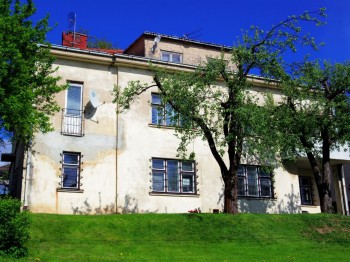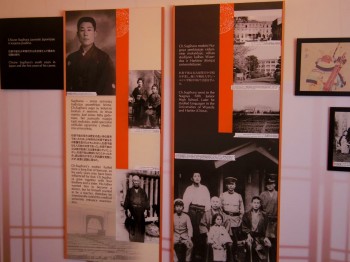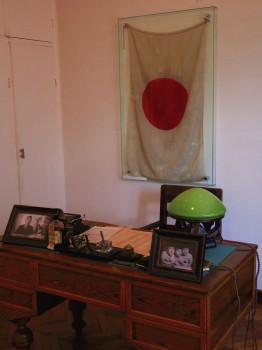I visited the above house in Kaunas, Lithuania last month. In 1940, this house was the Japanese consulate. Kaunas functioned as the capital city of Lithuania prior to the Second World War. The Lithuanians considered Vilnius to be their rightful capital, but it was masquerading as the Polish city of Wilno at the time. Upon the German occupation of Western Poland and the Soviet occupation of Eastern Poland in late 1939, many (both Polish and Lithuanian) Jews were trapped in Lithuania and clearly in great danger, but were unable to gain exit visas to leave the Soviet Union (or travel across it by the Trans-Siberian railway) unless they had visas to go somewhere else. There were Japanese government rules stating that transit visas could be issued to Japan, but only if the applicant had plans to go somewhere else after Japan, and also that he had adequate financial resources.
Seeing the desperation of the situation, and against orders, Japanese consul Chiune Sugihara issued Japanese transit visas to anyone who asked. (In the book Bloodlands historian Timothy Snyder – who clearly finds Sugihara as fascinating a figure as I do – makes it clear that Sugihara was a Japanese spy as well as a Japanese consul, and his job was to keep track of Soviet troop movements for the Japanese government). During September 1940 he spent something like 20 hours a day writing out visas. When the consulate was closed and he had to leave, he was followed by a crowd to the railway station. As his train left, he was still throwing blank visas with his seal and signature on them to a crowd of desperate people. In total, he wrote something like 3000 visas, and as dependent family members could travel on the same visa as the principal person it was written for, those visas covered several times that number of people.
Upon receiving these visas, Jews were able to travel on the Trans-Siberian railway to Vladivostok and then go by ship to Japan. They then dispersed to various places, but many were deported to Shanghai when the tripartite pact with Germany was signed shortly afterwards. Shanghai was also under Japanese occupation, and there these people spent time in the Shanghai ghetto – Restricted Sector for Stateless Refugees – where they stayed until Shanghai was liberated by the Americans in 1945. I visited the remnants of the Shanghai ghetto in 2006, and wrote about it at the time. Although this was crowded and at times squalid, it was a place of relative safety. The Japanese behaved monstrously towards certain other groups, but they had nothing against Jews, and did not turn the Jews in Shanghai over to the Germans despite German requests. Rather cleverly, Jewish leaders in Shanghai played upon Japanese mistrust of their German allies. Upon being asked by a Japanese governor why the Germans hated the Jews so much, rabbi Shimon Sholom Kalish replied “They hate us because we are short and dark haired”.
Most Jews who got to Shanghai survived, and then emigrated to Israel, Australia, the US and other places after 1945. Estimates of the number of lives saved by Sugihara go as high as 10,000, although estimates of about 6,000 seem more common.
Half of the building in Kaunas is now a museum to Sugihara. I wanted to see this – it was why I went to Kaunas. The other people in the museum when I went there were a busload of Japanese tourists. Almost everyone who had signed the guest book had done so in Japanese, too. I didn’t see any Lithuanians or many other Europeans, which is a shame given this extraordinary story.
It’s an exceptionally good thing that the museum is there, but I did find the tone of the museum to be slightly curious. The museum did seem to be going out of its way to present the Japanese in general in the best possible light overall, rather than simply telling the story of Sugihara. That Sugihara was acting against orders was mentioned but not emphasised, and much was made of Jews who reached Japan being treated well, but not much was said about where they went after the Japanese alliance with Germany intensified and they were deported from Japan. The truth – the Shanghai ghetto mentioned above – doesn’t actually reflect too badly on the Japanese, but it is rather unfortunately connected to other things that do reflect badly on the Japanese. It is impossible to praise Sugihara himself too much – the man saved the lives of 6,000 or more people just out of basic human decency – but does this reflect well on Japan as a whole? That is harder to say. As is the case with other various people who did similar things, his story remained obscure for many years. His career with the Japanese foreign service ended after the war for reasons that may or may not have had to do with disobeying orders in Lithuania.
Eventually, Sugihara’s story became widely known, and he was later honoured by Yad Vashem, the state of Israel, the state of Japan and the state of Lithuania, but this took a long time. As it did with Paul Grüninger, Oskar Schindler, and others.








God bless this righteous man.
My Russian history professor in grad school was born in the Shanghai ghetto. His view of some of his more progressive colleagues was jaundiced to say the least.
The Japanese people are polite and considerate but when they entered the Army they were dehumanised.
Yes indeed Valerie.
As for Shanghai – down the road (well quite a few miles away) is Nanking.
The German Consul there tried to protect civilians (from Japanese atrocities), just as this Japanese consul tried to help the Jews.
When one is not directly involved in something (when one is an outsider) it is less difficult to see it objectively – to see terrible crimes for what they are (terrible crimes).
It is truly a fascinating story and one I had never heard of before.
Fascinating. It makes me wonder who are the Sugiharas of today. Are there people today bending the rules to get innocent refugees out of warzones? Do we still consider them heroes when they are in the present day?
I am sure that such people exist in every conflict. When terrible things like this happen, there are always a few people who (regardless of risks and odds) stand up to save lives. They often don’t do well at the time, though. Sugihara lost his job in the Japanese diplomatic service in after the war, but so did lots of other people and evidence is ambiguous about whether this had anything to do with the visas he issued in Lithuania. There have certainly been claims that it did – I think his wife once stated that he had been told this – but these claims are all hearsay and unproveable. He was largely unknown in Japan when he died in 1985, although what he had done was well known in Israel by that point. Apparently many of his neighbours only found out about it when the Israeli ambassador to Japan attended his funeral along with a large delegation. The story is reasonably well known in Japan now. A former colleague of mine who lives in Tokyo tells me that he has seen documentaries about Sugihara on Japanese television.
Other people who did similar things fared worse. Paul Grüninger, who I mentioned briefly at the end of the post, was a Swiss policeman who saved 3600 lives by forging visas and other documents to allow Jewish refugees to remain in Switzerland. He was convicted of misconduct, dismissed from his post and stripped of his pension, and died in poverty in 1972. He was eventually rehabilitated and his relatives paid compensation, but this did not happen until 1995 and did not help him personally. He deserved much better. I suppose though that the people who suffered worst for being decent human beings were the ones who were actually caught by the Nazis at the time.
In the case of the Holocaust, well resourced organisations (most notably Yad Vashem in Jerusalem) exist that are determined to find out exactly what happened and insistent that people who did heroic things are remembered and honoured, however long after the fact. This is unusual. In the case of many other conflicts and even genocides, we never find out.
Individuality is what lifts humans from beastliness.
He makes a nice bookend for John Rabe, the “good Nazi” who sheltered Chinese from the Nanking Massacre.
Sugihara’s deed is part of a very strange larger story. In the 1930s, the Japanese ruling clique were still trying to figure out how to deal with the West.
In search of answers, they read all sorts of stuff. This included anti-semitic conspiracy theory such as The Protocols of the Elders of Zion. And they believed it.
They concluded that Japan’s problem was that they had no Jews. If they could recruit a cohort of Jews to work for them, their Jews could fix things with the Jews that controlled the U.S. and Britain.
This idea became the Fugu Plan. “Fugu” is the blowfish which is a great delicacy in Japan, though it is a deadly poison if not perfectly prepared. The Jews were considered analogous.
The plan was to settle Jewish emigrants from Europe in Japanese-controlled Manchuria. There were already some Jews in Manchuria among the White Russian refugees. Under the Plan, another 15,000 European Jews were allowed to enter Japanese territory (mainly to Shanghai).
The Plan was terminated in 1940, when Japan signed the Tripartite Pact and officially allied with Germany. Sugihara’s work came later, and was (as stated) against Japanese official policy at the time, but it was definitely based on this earlier history.
I remember reading this in The Economist, when The Economist was still worth reading; which just goes to show how old i am.
I completely forgot that it happened in Lithuania, though.
If only the early 20th Century Japanese had chosen parliamentary democracy as the best way to modernize, rather than Prussian militarism.
Regional,
If you consider the Japanese soldiers “dehumanized,” you have a very poor understanding of Japanese culture. They were acting according to a particular notion of honor, obedience, and contempt of the enemy that has a very long pedigree in Japan. To believe otherwise is to deny them of what few scraps of dignity their behavior possessed. It is also to absolve them of responsibility for their crimes.
I prefer to do neither, so I do not blithely consider millions of people to be unthinking robots. (We may repeat the exercise with Islamofascists as well, if you wish.)
Thanks Michael, that’s also interesting. I recognise there are others and they may not do well. I was more wondering if people fail to apply the same moral calculations to the present as they do to the past. It would be good if people could consider such heroic acts and not just seem them as history but as a suggestion that in our own time we should probably make it easier for refugees to escape from war zones.
Interestingly, I had never heard of this. Grandparents on both sides of the family escaped Lithuania for the west in that general time frame, closer to the end of the war.